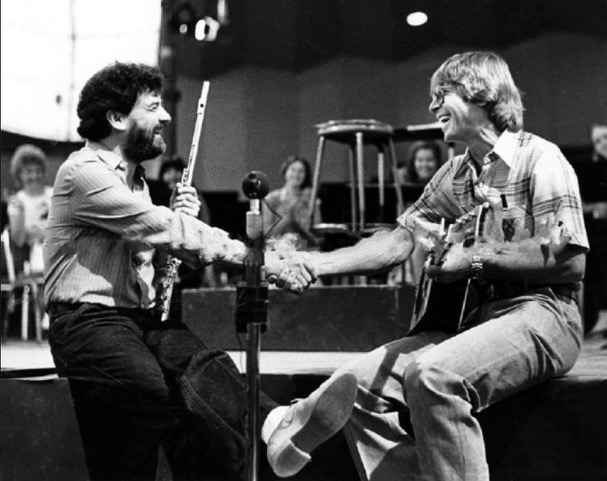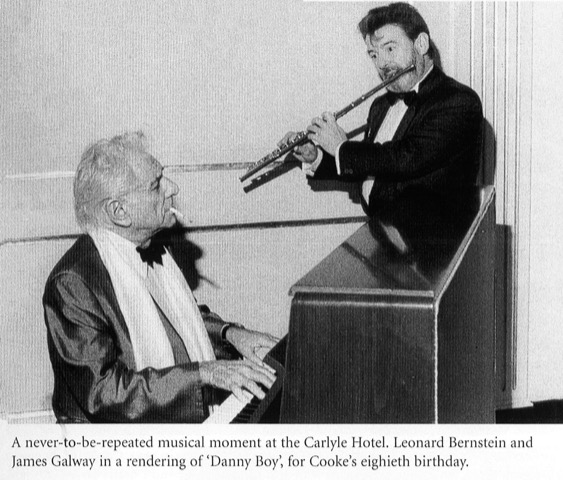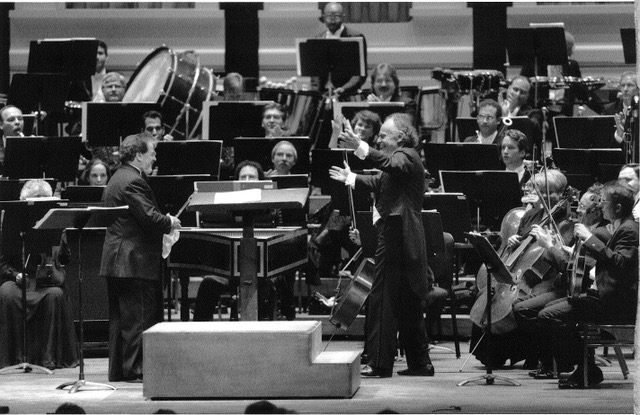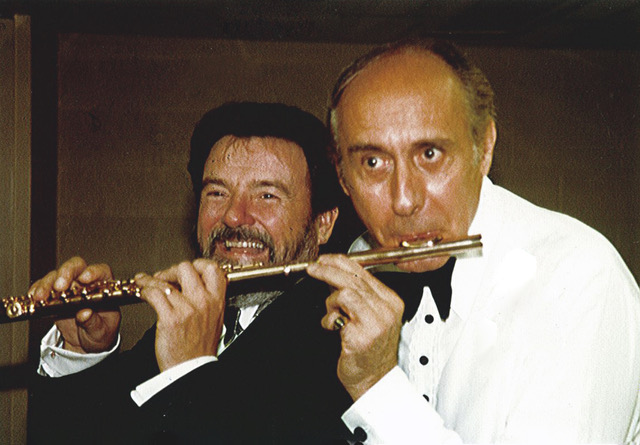Sir James Galway: Living Legend of the Flute
Q. Can you share your journey to becoming a renowned flutist? What inspired you to pursue the flute, and how did you develop your distinctive style over the years?
A. My inspiration was built in the family. My father played the flute, my Uncle Joe played the flute, and he taught me, my Grandad played the flute and taught everybody. I joined a flute band and later got into an amateur orchestra and from there I just practiced music. I didn’t practice too many scales and stuff like that.
This is a very difficult question because I did things differently. Instead of practicing technical things, I learned lots of melodies, for example ‘La Paloma’, a piece by Beethoven, Serenade by Haydn, and all these sorts of little tunes I learned and practiced.
I got inspired by great singers, great violinists, and great Cellists.
Q. Your performances often encompass a wide range of musical genres, from classical to traditional Irish folk music. How do you adapt your playing style and approach when moving between these different musical traditions?
A. You study the genres before, and then it just becomes a matter of taste, what you want to do, and how you want to play your little pieces.
For example, if I wanted to play a folk song, that was a chip of the old block and dead easy because I grew up playing all these things.
Q. You've collaborated with numerous world-class musicians throughout your career. Could you tell us about a particular collaboration that impacted your musical development and why it was significant?
A. The biggest influence on my life and playing was from Marcel Moyse and he taught me many, many things about how to play music.
I have had many spectacular collaborations, for example, with Lorin Maazel, Leonard Bernstein, Herbert von Karajan, Henry Mancini, Leonard Slatkin, Howard Shore and many more. These are all very special moments in my life. Playing ‘Gotterdammerung’ with Herbert von Karajan and the Berlin Philharmonic that’s a real thing! Playing all those flute concertos with Leonard, the first performances of things like the Lyric Concerto by William Bolcom; Lowell Liebermann, and many others.
They were all significant and so vivid in my memory because they were such wonderful collaborations with great musicians.

Q. As a performer, what techniques or exercises do you regularly practice to maintain and improve your flute-playing skills? How has your approach to practice evolved over time?
A. I regularly practice Marcel Moyse's Method and Taffanel & Gaubert complete. These exercises have played a big part in building a technique that I can call upon at any time and in any situation. I also practice studies not just to practice it but also to prepare certain aspects of my flute playing. Each study deals with a different aspect of flute playing.
Over time my practice became more free. When I was young, I practiced exactly what was on the page, but now I am a bit more free in my approach to practicing. The demands of the day increased, but I learned how to manage my time better and practice what was needed at the time.
Q. Your virtuosity on the flute is widely celebrated. Could you tell us about a particularly challenging piece you've mastered, and what strategies you used to overcome its difficulties?
A. I can say without doubt that the Rodrigo or the Corigliano are two very difficult concerti, and I really practiced them more than anything else. There is no real strategy. You just practice, practice, practice.

Q. You've played an essential role in popularizing the flute as a solo instrument. How have you seen the perception and appreciation of the flute change over your career, and what impact do you think you've had on its development?
A. I think I have a tremendous impact on this. Early on in my solo career, the BBC presented me in concert, and I started bringing classical pieces to the masses and would incorporate popular tunes with that, and it seemed to catch on, bridge the gap, and become really popular to a whole new audience.
The BBC also gave me my own TV series, which allowed me to bring many different musicians to perform, classical and popular.
Q. Your collaborations with other artists, such as Henry Mancini and John Denver, have been widely praised. What is it about cross-genre collaborations that excite you, and can you tell us about a collaboration that was particularly memorable or unexpected?
A. For me, this was very natural to do because I grew up on folk tunes. I always look for situations that produce good tunes, and nice melodies, and this is what brings the audience in. It is just exciting to work with other musicians.
One particularly memorable moment was at Sir Alistair Cooke’s 80th Birthday in New York and we were invited. We spontaneously decided to play something for his birthday, so Leonard Bernstein said ‘Jimmy, have you got your flute?’ to which I had to reply, ‘no’, so Jeanne dashed back to the hotel and got it for me. I said to Lenny, ‘what key are we going to play this in?’ and he said, ‘I’m going to play it in g minor, you play it in any key you want’! It worked out very well I have to say.
I also remember playing with BB King at the Hollywood Bowl Hall of Fame. We had rehearsed Peter Gunn in the afternoon but when it came to the concert in the evening, it was clear that the concert had nothing to do with the rehearsal!

Q. You've performed in various parts of the world. How have different cultures and their musical traditions influenced your approach to the flute and your music in general?
A. Different cultures have not particularly influenced my classical way of playing so much or allowed me to become an expect in the various genres, for example, I never became an expert in Indian music, which was all the rage. However, I did commission a concerto from John Mayer who was born in Calcutta and was a wonderful musician and he wrote a very good concerto for me called ‘Sri Krishna’ which we recorded in Whitfield Street in London and premiered in the Lincoln Centre.
What I have enjoyed during all my touring, is the time I had getting to know the people where I was touring and their cultures. Japan for example had a big influence on me particularly with their folk music. For example, every time we went to a restaurant there might be 5 or 6 Japanese people sitting in the corner, singing folk songs. I got to know a lot of these off by heart. The BBC decided, if we can get these things recorded, we will – and we did!
The folk music from many countries is actually very International.
Growing up in Belfast, my Mother used to play American folk tunes on piano at home. When I began touring in America, people were amazed that I knew all these folk tunes, which led me to record a few CD’s which included American Folk tunes like Shanandoah and a Country Western CD which I performed a few tunes from at the Grande ‘Ole Opry in Nashville.

Q. Your career has spanned decades and you've played with some of the world's greatest orchestras. Can you share a memorable performance or collaboration that has left a lasting impact on you, and what made it so special?
A. I was performing a newly commissioned flute concerto from ‘Mr X’ conducted by Lorin Maazel, and we did not think much of it. While we were rehearsing it, I was playing, and Lorin leaned over and said ‘I think I can write a better concerto than this’ and I said ‘why don’t you? I’ll play it!’. He did and I did, and it was a huge success!
Performing all the great German composers such as Beethoven & Brahms with Herbert von Karajan and the Berlin Philharmonic were very special and memorable. What made it so special was it was German music, performed by German people under a German conductor. The Orchestra and von Karajan were so well prepared, and he conducted everything from memory.
Q. In addition to your musical accomplishments, you've also been involved in various educational and charitable endeavors. Could you share some insights into the importance of music education and your experiences in using music to make a positive impact on the world?
A. If it wasn't for the music education that was available at the time when I was a young boy, I do not think I would have gotten so far. We were lucky enough to have great music schools, places to learn, good teachers and it all added up to giving us a good basis of musical education.
Today it is my passion to carry on the torch of learning. I hope that through my playing it will influence kids to get out there and realize their dreams. I hope that I leave this world a better place with the music that I have played.
